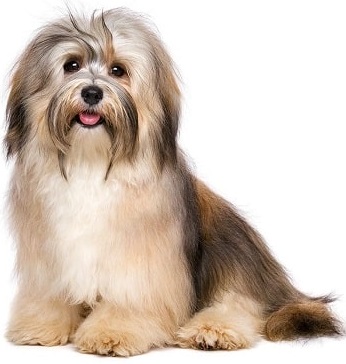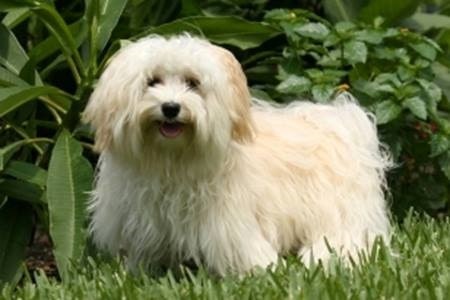The “little white dog of Havana”, Havanese has many fans due to its long silky hair, expressive eyes and a tiny size. His love for his owner and a constant need to stick with him gave him the name “Velcro dog”.
Mistaken for a lapdog, this little dog is a multitasker. Havanese is full of energy and excels in dog sports. Also, this little one is very trainable.
Havanese Dog Breed Overview

| Group: | Toy Group |
| Size: | Small (7-13 pounds) |
| Lifespan: | 12-15 years |
| Best Suited For: | Families |
| Temperament: | Affectionate, Intelligent, Gentle, Playful |
| Exercise Needs: | Moderate |
| Drooling Potential: | Low |
| Grooming Needs: | Moderate |
| Similar Breeds: | Maltese, Bichon Frise, Papillon dog |
1. Basic Features

Havanese is the national dog of Cuba and is loved by many. He is a lively little dog and loves to play. Despite being a toy breed, he is not overly delicate. Also, he is known for it’s long, silky coat.
They are found in multiple colors and have a tiny nose. Their muzzle, however, is full and tapers near the nose. They have a nice tail which is carried over it’s back.
Havanese are high spirited and very curious. They are smart and known for their intelligence.
2. Havanese Origin
Havanese are known to have arrived with Spanish settlers who came to Cuba in 1492. They belong to the Bichon family and are known to be an old breed.
The name Havanese originated from the capital city of Havana. They served as lapdogs for wealthy men in Havana. After a few years, the breed became a family pet. Other Europeans started noticing the little dog. Soon after, they became a huge hit in Europe.
Many known people like Queen Victoria and writer Charles Dickens are known for having a liking for this dog.
For a while, the breed popularity declined and it started becoming extinct. However, they made a comeback. This dog became refined and soon became famous in America and other countries as well.
3. The Personality of Havanese
The little dogs love their owners and get extremely attached to them.
They are extremely loyal and will follow their owner everywhere. And they thrive well in an apartment living due to their tiny size.
Much of its exercise can be done in a small space.
However, they are gentle beings and survive on human companionship. They are sturdy and most preferred as city dogs. Early socialization with a number of people and different places is very important in order to avoid them becoming timid with strangers.
4. Havanese behavior
The Havanese is a very smart dog. As they get very attached to their owners, they do not do very well alone. They have a wonderful temperament and are very friendly. These little ones tend to bark at strangers often and are willing to play with them.
They have a great need for affection and will do tasks to attract other people’s attention.
Also, The dog may suffer anxiety on being left alone. Their behavior also depends upon their socialization and training.
5. Exercise Requirements

The Havanese, despite their tiny size, have moderate needs for exercise. Hence, a walk and some play, even inside the house would be enough for him.
For that reason, I suggest you an apartment living for your doggie. However, they do well in any kind of houses as long as their owner stays with them.
Do not over exercise the dog, as it may cause exhaustion.
6. Diet Needs
They are small eaters and do not require as much food as required by a larger dog. Well, they do need a protein-rich diet to grow and stay healthy.
They also need a diet with good fat content. However, it is not recommended for a Havanese to have fat-rich foods as they are prone to getting overweight if they are fed fatty foods in excess.
Diet needs also change according to a dog’s age, sex, and lifestyle.
A standard meal is the one which is fed twice a day. 280 to 570 calories per day is perfect depending upon the weight of your dog.
7. Trainability
The little dog of Havana is an intelligent dog and responds well to training. They are sensitive dogs and positive training methods should be used with them. Thus, harsh voice or scolding should be avoided.
So, they may be easy to please but should be dealt with calmly.
Early socialization is also important for all-round development.
8. Common Health Problems

They have a long life and are quite a sturdy breed. They have very few health problems. However, eye disorders, heart diseases, and liver disorders may be seen.
Furthermore, they may also tear which leads to tearing stains which are visible. The requires special care and you should immediately recognize the symptoms.
9. Who should Adopt a Havanese?
Havanese are very adaptable and loving. They do well with all families and in all types of houses. This dog even lives well in an apartment. However, it is important to ensure that you are ready to give your dog plenty of time.
Thus, they are very affectionate and in return expect a lot of love back but if you are someone who does not have enough time to give to your dog then this may not be the right breed for you!
